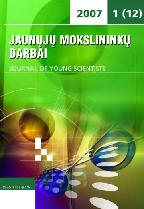Visuomenės požiūris į kitataučius: integracijos problemos ir galimybės
Community Attitudes towards Foreigners: Integration Problems and Opportunities
Author(s): Dovilė Kantauskaitė, Liuda RadzevičienėSubject(s): Social Sciences
Published by: VšĮ Šiaulių universiteto leidykla
Keywords: Foreign-born; integration; attitudes of society.
Summary/Abstract: The paper analyses discrimination of ethnic groups and peculiarities of integration, prevailing attitudes towards foreigners and possibilities to change them, functions and needs for social pedagogues as specialists in social work. The subject of the research was society’s attitude towards foreigners and possibilities of changing it. The aim of the research: to reveal attitudes prevailing in society towards foreigners and possibilities of changing them. Attitudes towards foreigners and possibilities of changing them were researched by a questionnaire survey method; how society members assess foreigners and whether they have any experience in communicating with them. The objectives: 1) to analyze scientific literature focusing on attitudes towards foreigners; 2) to identify attitudes of society towards foreigners and possibilities of changing them on the grounds of gender and age aspects and using Bogardus scale of social distance. The research revealed different attitudes of men and women towards foreigners; positive tendencies in the assessment of foreigners were more noticeable among women than men. Young age respondents were more tolerant towards foreigners than middle aged and elderly ones. People in towns had more experience in contacts with foreigners than those living in the county side. Problems of racism as relevant to Lithuania tended to be recognized by working people, for pensioners this problem did not exist. Analyzing societal attitudes to integration as a positive process, it was identified that job is one of possible ways of successful integration of foreigners into society as well as development of intercultural thinking. Education was mentioned as the main and the most significant factor of successful integration.
Journal: Jaunųjų mokslininkų darbai
- Issue Year: 2008
- Issue No: 2(18)
- Page Range: 180-184
- Page Count: 5
- Language: Lithuanian

